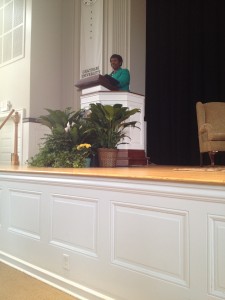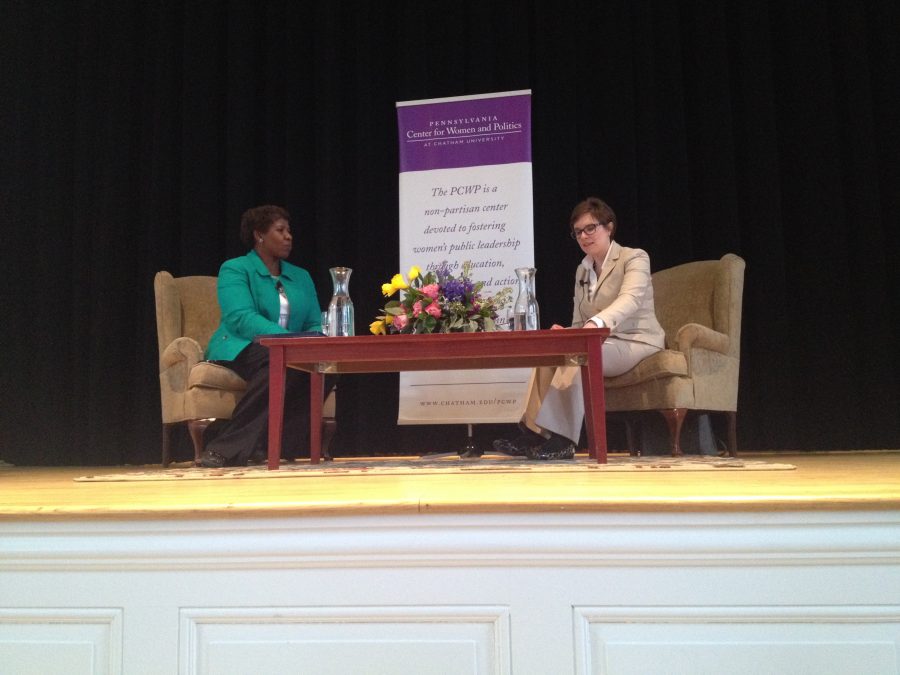On Wednesday, April 2, famed reporter Gwen Ifill visited Chatham University to give a public lecture entitled “Politics, Policy, and Reality: What’s Really Going on in Washington”.
The event was planned by the Pennsylvania Center for Women and Politics as the 2014 Elsie Hillman Chair in Women and Politics and it kicked off with a reception in the Mellon Living Room where Ifill talked about her life and how she got to where she is now.
After that, Ifill commanded the Campbell Memorial Chapel, which was packed full of people—many of them not affiliated with Chatham in any way. The event ended with a short Q&A for the audience.
On her beginnings as a journalist she said, “I have always wanted to be a newspaper writer. I liked the idea of asking questions and making people answer my questions, which I realized does not always occur.”
Ifill admitted that she was very lucky. She said, “I’ve lived in public housing as a child, yet I’ve travelled the world. I’ve lived from paycheck to paycheck, but I’ve interviewed presidents.”
She got work easily and moved up quickly through the world of journalism. After majoring in communications at Simmons College she had many internship opportunities and eventually landed her first job at the Boston Herald “because they let [her] in the door”.
She was asked to be a food writer although she had little experience in cooking. Ifill shared that when people called around Thanksgiving, asking her how to cook a turkey, she would make up temperatures and lengths of time for which to cook the turkey. She insisted that no one called back to say she was wrong, joking, “it either worked or they were dead.”
This experience taught her to ask about and research things that she was not familiar with. Later she worked with papers like The New York Times and Washington Post. It was there that she found her calling in political journalism. She worked at different newspapers and covered different types of politics.
In Boston she covered the school system, in Baltimore she moved up to City Hall. When she got to the Washington Post she covered county and state government. By the time she left to go to The New York Times she was covering Congress, presidential campaigns, and the White House.
On her first job covering a national campaign, Ifill was sent to see all of the candidates that had no chance of winning. Joking, she said, “It got to the point where if I walked into a candidates rally, they’d look at me and say “Oh no, Gwen’s here.” It’s like I was the angel of death!”

Ifill is now the managing editor and moderator of “Washington Week” and managing editor and co-anchor of the “PBS NewsHour”. As such, she reminisced on her two opportunities to be moderator and how both times she had moments where the candidates were unable to properly answer her.
Most memorably, she recounted asking former Vice President Dick Cheney and former Senator John Edwards about the rising HIV infections in African American Women. She specifically told them that she was not asking about AIDS in Africa. Cheney said he did not know about it and Edwards tried to tell her about his plan for AIDS in Africa. Ifill said she was later told that in Edwards’ debate preparation he was told she would ask about AIDS in Africa.
This showed the audience and the people of America who they were really voting for. Ifill said that as a moderator, questions must be chosen carefully, with voters in mind. The moderator must assume what voters really want to know about their candidates.
Ifill insisted then that people pay more attention to politics, considering politicians make so many decisions that affect American lives. She said that she watches John Stewart on “The Daily Show”, but he also watches her because you have to know the news to get the jokes. Of PBS she said, “We assume that you can decide what you think on your own. We just give you the information.”
Still, Ifill admits it is quite hard to be part of the world of journalism where optimists and idealists like her are very rare. She even said that she has liked almost every politician she has met and thought that they were honorable people. She said it was all about seeing the difference between being a skeptic and being an cynic.
She explained that skepticism is always having another question and asking “why”. Cynicism is deciding you know the answer, shutting down, and no longer listening. Ifill said, “You can be a skeptic and still be an optimist.”
And although she explained that journalists thrive on dysfunction, she said, “As much as we live for bad news, I don’t wish for bad news.” She said Washington D.C. runs on a routine of artificial deadlines, fake fights, and finger pointing—making Congress sound more like a defiant child than a collection of elected adults.
When something exciting happens, journalists suddenly face a mixture of elatedness and natural distress. She related journalism at its most challenging to her mother trying to use an orange to mask the taste of castor oil. It was a way of disguising an unpleasant truth.
However, Ifill does not plan to give up easily. She said that, as a child, she and her sister were never told that they could do things “even though you’re black” or “even though you’re a woman”. And although she never planned to go to a women’s college, she loved her experience at Simmons.
Aware that she would be asked at both events about her stance on women’s colleges, she said, “At a women’s college we learned to speak up. We learned how to be in charge. We learned how to value women’s voices and women’s world views, and we learned that change is as terrifying as it is necessary.”
Then Ifill made herself even clearer. “I know there’s a debate underway here at Chatham and I wish you the best,” she said. “I don’t know enough to tell you the way it ought to turn out, but the truth remains that your voices are valuable, and that they are important.”
Watch Gwen Ifill on “NewsHour” on PBS.


